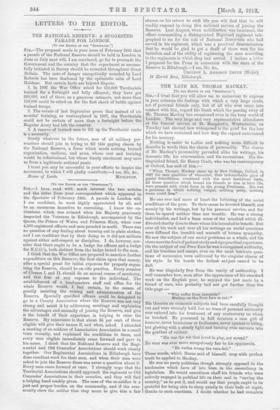THE LATE MR. THOMAS MACKAY.
[To TRE EDITOR OP TUN "SPEOTATOR."1
trust that you will allow me to endeavour to express in your columns the feelings with which a very large circle, not of personal friends only, but of all who ever came into contact with him, regard the blank which the passing away of Mr. Thomas Mackay has occasioned even in the busy world of London. The very large and very representative attendance at the funeral service at St. Margaret's, Westminster, on Tuesday last showed how widespread is the grief for the loss which we have sustained and how deep the regard entertained for his memory.
Nothing is easier to r.alize and nothing more difficult to describe in words than the charm of personality. The charm. of Mr. Maokay's personality pervaded alike his writings, his domestic life, his conversation, and his recreations. His dis- tinguished friend, Sir Henry Craik, who was his contemporary at Oxford, has said of him :-
"When Thomas Mackay came up to New College, Oxford, in 1867 his rare qualities of character, that indescribable glow of genial friendliness, combined with the most fastidious taste, all those qualities which bound his friends to him in later life, were present with vivid force in the young Freshman. His was a presence in which nothing vulgar, nothing petty, nothing mean could live."
No one ever had more at heart the bettering of the social conditions of the poor. To their cause he devoted himself, not merely by his writings, but by his personal service, and for them he spared neither time nor trouble. He was a strong individualist, and bad a keen sense of the mischief which ill- directed charity does to those whom it is intended to benefit. But over all his work and over all his writings on social questions were diffused the breadth and warmth of human sympathy. He saw the subject of our social problems as a whole, and his views were the fruit of patient study and ripe practical experience. On the subject of our Poor Law he was &recognized authority, and his treatises and essays, even on the most intricate ques- tions of economics, were enlivened by the singular charm of his style. In his hands the dullest subject ceased to be dull.
He was singularly free from the vanity of authorship. I well remember how, soon after the appearance of his standard work on the English poor, he enjoyed the jest made by a friend of ours, who probably bad not got further than the title-page "Why suffer from insomnia P Mackay on the Poor Law is out !"
We theories on economic subjects had been carefully thought out and were strongly held, but no trace of personal animosity ever entered into his treatment of any controversy on which he touched. He possessed in full measure a rare gift of humour, never boisterous or frolicsome, never cynical or biting, but glowing with a steady light and turning even sarcasm into the gentlest of raillery.
was the wit that loved to play, not wound."
No man was ever more scrupulously fair to his opponents. "He wadna wrang the vera deil."
These words, which Burns said of himself, may with perfect truth be applied to Mackay.
He was no party politician though strongly opposed to the tendencies which have of late been in the ascendancy in legislation. He would sometimes chaff his friends who were actively engaged in political life on their zeal in "saving the country," as he put it, and would say that people ought to be grateful for being able to sleep quietly in their beds at night, thanks to such exertions. I doubt whether he had complete
faith in the wisdom even of the House of Commons. He told with keen appreciation of an old officer who on his return after baying done his life's work in India, speaking of the House of Commons, asked, "Is that thing still going on?"
His interests were singularly wide and varied. Life on all its sides appealed to him. He was a keen fisherman, but perhaps it was on the golf links that he was seen at his best. When barely of age he won at St. Andrews the medal of the Royal and Ancient, and to the end of his life golf was his favourite amusement. In a match he was the best of partners and the most delightful of companions. One treasures the memory of rounds played in his company.
No man was ever more universally beloved, and all who have met him feel that his death has loft the world the poorer. The freshness of his interests never wore off. To the very last he delighted in the company of young people, and entered with the keenest zest into all their interests and amusements.
His is an abiding memory, and he will ever live in the hearts of his friends. I wish it were in my power to pay a more adequate tribute to a lifelong friend and to give fuller expression to the feelings with which he will always be remembered by all who knew him.—I am, Sir, &a.,
[May we add our tribute to that so finely bestowed by Sir Robert Finlay ? Mr. Mackay was a frequent contributor to the Spectator. His economic wisdom was great, but he valued it only because it could be of service to his fellow-men.—En. Spectator.]











































 Previous page
Previous page